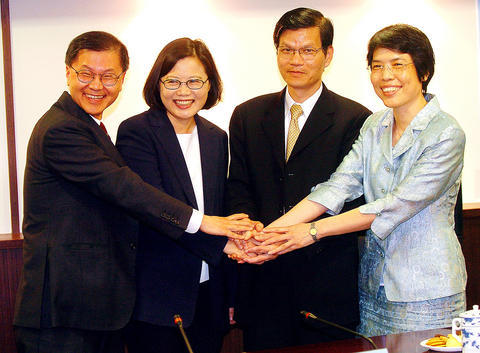The government is making a new push into the biotechnology sector by investing in a company that will focus on the development of a drug for treating AIDS.
The state-owned National Development Fund (NDF) will pump in US$20 million to help establish a biotech firm to be called TaiMed Biologics, Council for Economic Planning and Development Chairwoman Ho Mei-yueh (何美玥) told a press conference yesterday.
The move is one of a package of government measures designed to turn the nation's biotech industry into a trillion-dollar sector, following in the footsteps of the foundry and display industries.

PHOTO: CHEN TSE-MING, TAIPEI TIMES
Of the NT$30 billion (US$907 million) budget the government plans to invest in the biotech sector, the state fund has directly invested NT$8 billion in 12 biotech companies, Ho said, adding that the government could pump in more capital to fuel the industry's growth even after the budget is expended.
The new biotech company will be chaired by former vice premier Tsai Ying-wen (
David Ho told the press conference that, although it was impossible to know whether the NDF would see significant returns from its investment in TaiMed Biologics, this kind of investment is needed to stimulate the industry.
TaiMed Biologics purchased the patent for the drug TNX-355, which was developed by US-based Genentech Inc, and plans to complete development of the drug, which blocks HIV from entering human cells, in three years.
After launching TNX-355 on the global market, TaiMed Biologics will devote itself to developing flu and bird flu vaccines, he said.
If TaiMed Biologics later establishes a plant to manufacture drugs or other medical products, the NDF would also finance that, Ho Mei-yueh said.
Inviting private enterprises to jointly invest in TaiMed Biologics, the CEPD chairwoman said she had a shortlist of possible investors and would first approach Terry Gou (郭台銘), chairman of Hon Hai Precision Industry Co (鴻海精密).
On Sept. 4, Gou announced he would donate NT$15 billion to National Taiwan University to fund biomedical engineering projects and the construction of a hospital for treating cancer.
In June, Gou, who leads the world's largest contract maker of electronic components, reportedly said he would donate NT$100 billion to fund cancer research by scientists in Taiwan and China.
"I will brief him [to try to win] his support for the company [TaiMed Biologics]," Ho Mei-yueh said.
To encourage development of the biotechnology and pharmaceutical industry, the legislature in June passed tthe Biotech and New Pharmaceutical Development Statute (
The new law stipulates that 35 percent of company investment in R&D and personnel training in the two sectors is tax-deductible for the next five years.
If a firm's expenditure on R&D and personnel exceeds its average spending in the previous two years, 50 percent of the extra amount is tax-deductible.
In addition, employees in the industries who receive stock options do not need to pay income tax on their shares.
Government researchers who get permission from the institute where they are employed can also cooperate with private companies to develop new drugs, while researchers can work as consultants at private companies.

The US dollar was trading at NT$29.7 at 10am today on the Taipei Foreign Exchange, as the New Taiwan dollar gained NT$1.364 from the previous close last week. The NT dollar continued to rise today, after surging 3.07 percent on Friday. After opening at NT$30.91, the NT dollar gained more than NT$1 in just 15 minutes, briefly passing the NT$30 mark. Before the US Department of the Treasury's semi-annual currency report came out, expectations that the NT dollar would keep rising were already building. The NT dollar on Friday closed at NT$31.064, up by NT$0.953 — a 3.07 percent single-day gain. Today,

‘SHORT TERM’: The local currency would likely remain strong in the near term, driven by anticipated US trade pressure, capital inflows and expectations of a US Fed rate cut The US dollar is expected to fall below NT$30 in the near term, as traders anticipate increased pressure from Washington for Taiwan to allow the New Taiwan dollar to appreciate, Cathay United Bank (國泰世華銀行) chief economist Lin Chi-chao (林啟超) said. Following a sharp drop in the greenback against the NT dollar on Friday, Lin told the Central News Agency that the local currency is likely to remain strong in the short term, driven in part by market psychology surrounding anticipated US policy pressure. On Friday, the US dollar fell NT$0.953, or 3.07 percent, closing at NT$31.064 — its lowest level since Jan.

The New Taiwan dollar and Taiwanese stocks surged on signs that trade tensions between the world’s top two economies might start easing and as US tech earnings boosted the outlook of the nation’s semiconductor exports. The NT dollar strengthened as much as 3.8 percent versus the US dollar to 30.815, the biggest intraday gain since January 2011, closing at NT$31.064. The benchmark TAIEX jumped 2.73 percent to outperform the region’s equity gauges. Outlook for global trade improved after China said it is assessing possible trade talks with the US, providing a boost for the nation’s currency and shares. As the NT dollar

The Financial Supervisory Commission (FSC) yesterday met with some of the nation’s largest insurance companies as a skyrocketing New Taiwan dollar piles pressure on their hundreds of billions of dollars in US bond investments. The commission has asked some life insurance firms, among the biggest Asian holders of US debt, to discuss how the rapidly strengthening NT dollar has impacted their operations, people familiar with the matter said. The meeting took place as the NT dollar jumped as much as 5 percent yesterday, its biggest intraday gain in more than three decades. The local currency surged as exporters rushed to